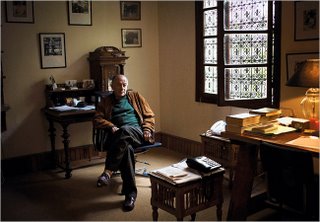 Imagine my surprise this morning when the normally uneventful stroll through the Sunday New York Times yielded this fascinating portrait of a Spanish novelist I had never heard of.
Imagine my surprise this morning when the normally uneventful stroll through the Sunday New York Times yielded this fascinating portrait of a Spanish novelist I had never heard of.Juan Goytisolo is a character lifted off the pages of a magical realist novel. He is a Spanish expatriate novelist who has lived in the Jemaa el Fna neighborhood of Marrakesh for 25 years, has a scholarly interest in Sufi Muslim thought and Arabic and Turkish grammar and is an outspoken public intellectual who regularly writes for the Spanish newspaper El Pais. His tangled sexual identity adds more color to the portrait: he is a homeosexual who lived for 40 years with a French woman he says was her only love and today shares the quarters in his Marrakesh home with two Morrocan brothers and their three children.
Here are some interesting excerpts from the profile:
"You can't understand Cervantes or Fernando de Rojas" — the presumed author of the 15th-century comedy "La Celestina" — "without knowing they were both converted Jews, on the periphery of Spanish life. The regard from the periphery to the center is always more interesting.""Struggling for a world that would be impossible for us": what a striking phrase that expresses an essentially tragic view of life. On reading this I was reminded of the lyrics of Rabbi Shergill's song "Jugni" about the emptiness of much urban life amongst the frenzied dash for material possessions.
Tariq Ali, --- describes Goytisolo as "the exact opposite of V. S. Naipaul. Naipaul came from Trinidad, a tiny colony, to the center of empire, and became an empire loyalist. Juan is trying to recover the vanished glory of an Andalusia which was destroyed by Catholicism. I'd say he's on the main track of history at the moment."
For Goytisolo, there are two worlds, and the gap between them is getting dangerously wide. There is the world he loves — the world of public storytellers, open-air cinemas and wandering saints, a world born out of an extreme poverty that both troubles and fascinates him. --- Then there is the developed world, in which elections are free and children no longer die of curable diseases but human relations are diminished, homogenized. "For many years, I've felt we were struggling for a world that would be impossible for us."
Jugni ja pohnchi Bambai
Jithe saunda koi nahin
Sab labhan cheez koi
Kisse kisse nu labhe
Jinnu labhe oh bechain
Matthe vat fir usdey painh
1 comment:
Attended Rabbi's concert a couple of days ago. Quite an experience.
Post a Comment